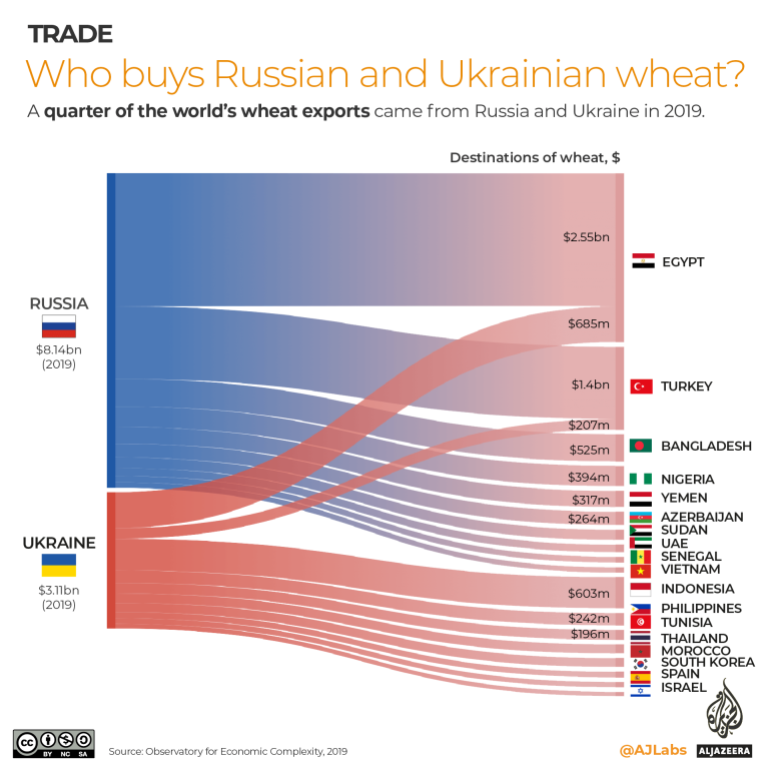Food security implies a country’s access to sufficient and nutritious food for its people. This balance is now under immense pressure due to the ongoing war in Ukraine. Ukraine, nicknamed the “Breadbasket of Europe,” has been a major exporter of wheat, corn, and sunflower oil for decades. However, the conflict has disrupted agricultural production and exports, sending shockwaves through the international food system. This article explores the far-reaching consequences of the war on global food security, with a specific look at the impact on Pakistan, a nation heavily reliant on wheat imports.
Disrupted Supply Chains
Before the war, Ukraine and Russia together accounted for nearly 30% of global wheat exports.
Before the war, Ukraine and Russia together accounted for nearly 30% of global wheat exports. The conflict has significantly hampered their ability to export, leading to a global supply shortage. According to the World Bank’s April 2022 Commodity Markets Outlook, wheat prices surged by 47% compared to January 2021, while maize prices increased by 42%. This price surge disproportionately affects low- and middle-income countries, where a significant portion of household income goes towards food.
The Food and Agriculture Organization (FAO) of the United Nations estimates that the war could lead to an additional 47 million people facing acute hunger in 2023, adding to the pre-war figure of 276 million. This hunger crisis is particularly concerning in regions already facing food insecurity due to climate change and conflict, such as East Africa and the Middle East.
Fertilizer Shortage Looms
Another critical factor is the disruption to fertilizer supplies. Russia is a major producer and exporter of fertilizers, and sanctions imposed due to the war have limited fertilizer availability. This can have long-term consequences for global food production, as farmers struggle to maintain crop yields without adequate fertilizer application.
The Ripple Effect on Other Staples
The war in Ukraine has also impacted the prices of other food staples. Sunflower oil, another major Ukrainian export, has seen significant price increases. This can have a cascading effect on other cooking oils and food products that rely on sunflower oil as an ingredient, further straining household budgets.
The Looming Threat of Climate Change
The situation is further complicated by the looming threat of climate change. Extreme weather events like droughts and floods can disrupt agricultural production and exacerbate food insecurity. The war in Ukraine, coupled with climate change, creates a perfect storm for a global food crisis.
Also Read: Putin’s Fifth Term: Unchallenged Victory
Impact on Pakistan
Pakistan, a country heavily reliant on wheat imports, is not immune to these global food security concerns. Pakistan imports nearly 30% of its wheat, with Ukraine being a significant supplier. The disruption in Ukrainian exports has forced Pakistan to turn to alternative sources like Russia and Kazakhstan, often at higher prices.
The rising global food prices have a domino effect in Pakistan, pushing up domestic food prices.
The rising global food prices have a domino effect in Pakistan, pushing up domestic food prices. A report by the Pakistan Institute of Development Economics (PIDE) suggests that wheat flour prices in Pakistan have increased by over 20% since the war began. This disproportionately impacts low-income households, forcing them to reduce food consumption or shift towards cheaper, less nutritious options.

Seeking Solutions
Addressing this looming food crisis necessitates a multi-pronged approach. Encouraging increased agricultural production in other countries can help offset the decline from Ukraine and Russia. This includes supporting smallholder farmers and investing in sustainable farming practices that are more resilient to climate shocks. Countries reliant on wheat imports should explore alternative food sources, such as locally grown staples like Millet or Sorghum. Governments of vulnerable countries need to strengthen social safety nets to support low-income populations struggling with rising food prices. This could include targeted food subsidies or cash transfer programs. International organizations like the FAO and the World Food Programme (WFP) play a crucial role in coordinating humanitarian efforts and delivering food aid to the most vulnerable populations.
Pakistan’s Response:
The Pakistani government has taken some initial steps to address the food security challenge. Pakistan has been actively seeking alternative wheat suppliers to replace the shortfall from Ukraine. This includes negotiations with countries like Russia, Kazakhstan, and Romania. In April 2023, Pakistan secured a deal to import wheat from Russia. The Government has taken steps to increase domestic wheat reserves by encouraging farmers to hold onto their stocks and by authorizing additional wheat imports to build strategic reserves. Some initiatives aim to support farmers by providing them with subsidized fertilizer and seeds to encourage increased wheat production in the coming season.
The Kissan Package offers financial assistance to farmers for fertilizer purchases and other agricultural inputs. However, more needs to be done. Long-term solutions lie in promoting diversification of Pakistan’s food sources, investing in domestic food production through improved irrigation systems and seed technology, and building resilience in the face of future food shocks by promoting climate-smart agriculture practices.
Conclusion
The war in Ukraine serves as a stark reminder of the fragility of global food security. While the immediate crisis demands urgent action, it’s equally important to build long-term resilience. By investing in sustainable food systems, diversifying food sources, strengthening social safety nets, and promoting climate-smart agriculture, countries like Pakistan can weather future food security challenges and ensure access to nutritious food for all its citizens.
The opinions shared in this article reflect the author’s personal views and do not necessarily align with the institution’s official stance.





